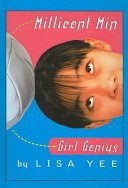 Millicent Min, Girl Genius
Millicent Min, Girl Genius
Written by Lisa Yee
Scholastic, 2003, 248 pp.
ISBN: 9780439425209
Millicent Min is an eleven year old whose immediate objective is “to become JFK High School Valedictorian.” She says that others accuse her of being anal retentive, an overachiever, and a compulsive perfectionist, all of which she attributes to being a genius. Socially awkward, Millicent’s only and best friend is her hip grandmother whom she calls Maddie. Her concerned parents attempt to help Millicent live the life of a “normal” eleven year old by signing her up to play volleyball over the summer. They also force her to tutor Stanford Wong, who Millicent considers to be “the poster boy for Chinese geekdom.” Millicent is convinced that her parents will ruin “Millicent’s List of Splendid Summer Activities” that includes attending her first college poetry course and spending time with Maddie. Unfortunately, Maddie is dealing with the loss of her husband and leaves to attend a feng shui academy. While playing volleyball Millicent meets a new girl, Emily Ebers, who actually thinks Millicent is cool. Millicent is afraid that Emily won’t want to continue being her friend if Emily finds out how smart she really is. Millicent spends her summer trying to hold together her friendship with Emily. In order to do this she must enlist the help of Stanford who, much to Millicent’s disgust, Emily finds attractive. Together with Stanford and Emily, Millicent learns about friendship and about real life beyond being a genius.
Yee does an excellent job of playing on readers’ expectations of Asian stereotypes and challenging these images through her Chinese American protagonists, Millicent Min and Stanford Wong. Millicent is academically advanced, perpetuating the model minority myth (Asian American youth are passive, studious over-achievers), and Stanford is the antithesis of the model minority myth, preferring basketball to school. When read along with Yee’s Stanford Wong Flunks Big Time (2005), teachers and students can explore the complexities of Asian American culture and youth identities. Yee skillfully uses the model minority stereotype as somewhat of a social liability for both Millicent and Stanford, who are both 4th generation Chinese Americans.
While Yee does not play the explicit Asian card, there are references to Chinese cultural stereotypes of eating dim sum, practicing feng shui, and learning kung fu, along with nuances of traditional values. Family plays an important role in both Millicent and Stanford’s lives, with their 2nd generation grandmothers utilizing the oral tradition of storytelling to share insights about their past. Both Millicent and Stanford try to separate themselves from their “Chinese-ness,” yet both appreciate their Chinese-American grandmothers who help them cope with preteen anxieties. Yee juxtaposes the Min and Wong families and portrays them as diverse Asian American families whose lives are complicated by their social stances. The book both contradicts and perpetuates stereotypes; Yee provides readers with a forum to explore complex issues surrounding Asian American representation in YA literature.
Students can read Yee’s trilogy books that tell parallel stories from the each of the three characters’ perspectives and engage in literature discussion circles around the concept of stereotypes: Millicent Min, Girl Genius; Stanford Wong Flunks Big-Time; Totally Emily Ebers. They can also analyze characters’ perspectives toward each other and their different accounts of the same events. Another possibility is to create additional text sets around common stereotypes (ethnic, gender, social class, etc.) for students to explore. The power of Yee’s books is enhanced by the use of universal themes. Readers can engage with very different Asian American characters who encounter struggles both unique to Asian Americans, yet universal to all American preteens.
Michele Ebersole, University of Hawaii at Hilo, Hilo, HI
Avis Masuda, University of Hawaii at Hilo, Hilo, HI
WOW Review, Volume II, Issue 3 by Worlds of Words is licensed under a Creative Commons Attribution-NonCommercial-ShareAlike 4.0 International License. Based on work at https://wowlit.org/on-line-publications/review/ii-3/
